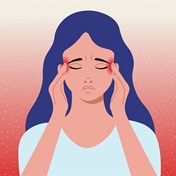People with severe forms of double jointedness are at greater risk for migraine headaches, a new study finds. They also tend to have more severe and more frequent migraines.
Researchers say that the two conditions - joint hypermobility syndrome and migraines - may have causes rooted in the same problem.
People who fit the profile for having joint hypermobility have contortionist-like flexibility.
"It's a disease of collagen, basically," study author Dr Vincent Martin, a professor at the University of Cincinnati College of Medicine in the US, told Reuters Health.
Collagen too elastic
Martin's hypothesis is that if the collagen is too elastic, it leads to both flexible joints and very flexible blood vessels - problems involved in joint hypermobility syndrome and migraine, respectively.
Martin had noticed in his clinical practice that double-jointed patients seemed to suffer from migraines, too. He also drew from his own experience, having both hypermobility and migraine headaches.
Previous studies had noted the association, but Martin said his is the first to use the proper migraine diagnosis and an appropriate comparison group.
The study
Using data from interviews and written questionnaires, he and colleagues compared 28 severely double-jointed women to 232 women selected from the rolls of two primary care practices (hypermobility is more common among women).
As reported in Cephalalgia, 75% of double-jointed people also got migraines, versus 43% in the comparison group.
When taking into account the participants' age and medication use, double-jointed people had three times the risk of migraines compared to their less flexible peers.
They also had migraines on nearly twice as many days each month, and were more likely to experience migraine with aura.
Significant numbers
Although Martin wasn't surprised that migraines were more common among the ultra-flexible group, he was impressed by the numbers. "The fact that we found 75% of (hypermobility) patients had migraine was huge."
Dr Blair Grubb, who wasn't involved in the study, said he agrees that collagen is the link between the two conditions, and he added that the new findings didn't surprise him.
"It's one of those things where everybody knew it and somebody just got around to publishing it," said Grubb, a professor at the University of Toledo Medical Centre.
In the general population, nearly one out of every five women gets migraines (for men, it's about one in 16). That's less than in the current study, likely because both groups of women were selected from doctors' offices.
Health issues linked with hypermobility
Joint hypermobility is not strictly painful, nor does it require treatment. But many people diagnosed with it have "stacks" of other medical problems, Martin said, such as fibromyalgia, neck pain, sleep disorders and anxiety.
No possible genetic culprits have been identified.
Joint hypermobility syndrome may affect up to 10% of women, Martin said, but that includes people with milder cases. The severe form, Ehlers-Danlos syndrome, occurs in one out of every 5,000 people.
Because the 28 patients with the syndrome were selected from a specialty connective tissue clinic, there's a chance the results could have been skewed toward a sicker group.
Martin said he and his colleagues are testing whether or not this is the case in a follow-up study, by selecting double-jointed patients from primary care practices.
GlaxoSmithKline, a pharmaceutical company that markets over-the-counter and prescription medications used to treat migraine, helped fund this study. - (Kerry Grens/Reuters Health, March 2011)
Read more:
Headache? Listen to your body




 Publications
Publications
 Partners
Partners














